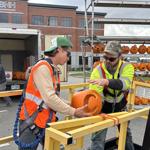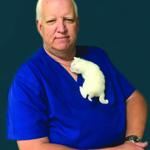LACONIA — With no cases of COVID-19 reported yet at Lakes Region General Hospital, officials were using this period of relative calm to get ready for what may be a storm of patients suffering from the respiratory disease.
LRGHeathcare President Kevin Donovan said he expects the number of cases locally to increase relatively quickly and that there could be a surge in the next week or two.
“Whatever we can do to get people to take social distancing seriously, the better off everyone will be,” he said. “We will be OK if we can flatten the curve and not get a spike in cases.”
At a meeting over the weekend, Fire Chief Kirk Beattie, the city’s emergency management director, said there are contingency plans to use Laconia Middle School as an overflow medical treatment facility should it be needed.
Dr. Fred Jones, the chief medical officer for LRGH, said that, if the hospital ran out of regular patient rooms, they would put additional patients in the hallways and in the cafeteria before they would turn to placing patients off-site.
Surgeon General Dr. Jerome Adams said in televised reports Monday that the country is at a “critical inflection point” and that the number of cases could increase quickly, as they did in Italy, which had 1,700 cases of coronavirus and 34 deaths two weeks ago and now has 25,000 cases and more than 1,800 deaths.
More and more cases are being reported in New Hampshire as the number of people being tested grows.
Seven people had tested positive for the disease by Friday, according to the state Health and Human Services Department. The total grew to 13 on Sunday. On Monday at 9 a.m., the number had grown to 17, with five in Grafton County, one in Carroll County, one in Nashua, and 10 in Rockingham County.
A total of 567 people have been tested by the state Public Health Laboratories, but that number is expected to grow quickly as private labs begin testing as well. Test results are pending for 95 people, while 534 other people are being monitored.
In Laconia, LRGH was planning to test people in their cars in a parking lot to reduce potential exposure to others. A doctor must have a written an order for such testing.
Under government health guidelines, testing is indicated for people with cough and fever who have traveled to countries where the disease is widespread, those with underlying medical conditions that could make them more vulnerable, older adults, and those working in the healthcare industry or who work with large numbers of the elderly.
Meanwhile, steps are being taken to limit the potential for community spread of the disease.
The U.S. Centers for Disease Control and Prevention has urged against meetings of 50 people or more, but the advice did not apply to businesses or schools. Even smaller events were discouraged unless they could be conducted in adherence to good hygiene practices and social distancing.
Meetings are important to those in the drug recovery community.
Daisy Pierce, executive director of Navigating Recovery, said the organization was still open for people in crisis or with scheduled appointments, but was assessing the situation daily.
“We are not hosting any group activities during the day and ask that participants not hang out at the center,” she said in an email. “There are online meeting formats that we share on our website and Facebook — some being offered several times a day & 7 days a week, and we will continue to offer telephone support services to anyone — even if they are home sick.
“The Substance Use Disorder population may be at greater risk due to compromised immune systems, as well as anyone who smokes/vapes, so we are diligently cleaning the center several times a day.”
The state Health and Human Services Department announced it would be conducting all interviews by phone for the Bureau of Family Assistance, the Bureau of Child Support and the Bureau of Employment Services.
The department issued guidelines to employers, urging them to have employees with symptoms of acute respiratory illness to stay home and not come to work until they are free of fever and other symptoms for 24 hours without the use of fever-reducing medicines or cough suppressants.
It also recommended flexibility for employees to stay home to care for a sick family members. Others recommendations were for employees to use good hand hygiene and to step up routine cleaning.

















(0) comments
Welcome to the discussion.
Log In
Keep it Clean. Please avoid obscene, vulgar, lewd, racist or sexually-oriented language.
PLEASE TURN OFF YOUR CAPS LOCK.
Don't Threaten. Threats of harming another person will not be tolerated.
Be Truthful. Don't knowingly lie about anyone or anything.
Be Nice. No racism, sexism or any sort of -ism that is degrading to another person.
Be Proactive. Use the 'Report' link on each comment to let us know of abusive posts.
Share with Us. We'd love to hear eyewitness accounts, the history behind an article.